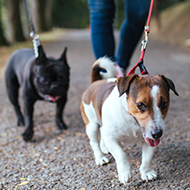UK dog thefts hit seven-year high

London saw the highest number of reported dog thefts of any region.
Pet owners are being urged to keep their microchipping contact details up to date, as the number of dogs stolen in the UK reaches a seven-year high.
Research from Direct Line Pet Insurance shows that in 2021, the number of dogs stolen in the UK soared by 13 per cent to 2,760 - a figure that equates to eight dogs stolen every day, and the highest levels since Direct Line started analysing theft rates in 2015.
Perhaps unsurprisingly, the findings show that French bulldogs and Jack Russells were among the most targeted breeds in 2021. Other popular targets were chihuahuas and pugs.
London saw the highest number of reported dog thefts of any region, with the Met Police reporting 422 dogs stolen, followed by West Yorkshire (199) and Kent Police (182).
Madeline Pike, a veterinary nurse for Direct Line Pet Insurance, says the higher cost of certain dog breeds coupled with the demand for ownership created by the COVID-19 pandemic has made opportunities for dog thieves more abundant than ever.
“It’s devastating to see the number of dogs stolen continues to increase across the country," she said. "Unfortunately, the increase in dog ownership since the pandemic began and the subsequent rise in prices of these animals seems to make the crime even more appealing to thieves.
"The law will soon recognise dogs as members of the family with feelings, not just owned property, and we hope that this will deter criminals, especially if they can be punished more severely if prosecuted."
She went on to say that anybody thinking about buying a puppy should properly examine its origin and observe the dog with its mother to make sure they are not purchasing from a criminal organisation.
"Taking simple precautions such as not leaving your dog tied up outside a shop, left inside an empty car or keeping it on the lead when in busy areas, will help reduce the likelihood of being targeted," she said. "It’s also vital to keep microchipping contact details up to date in case your dog does go missing and is handed in.”



 The Veterinary Medicines Directorate (VMD) is inviting applications from veterinary students to attend a one-week extramural studies (EMS) placement in July 2026.
The Veterinary Medicines Directorate (VMD) is inviting applications from veterinary students to attend a one-week extramural studies (EMS) placement in July 2026.